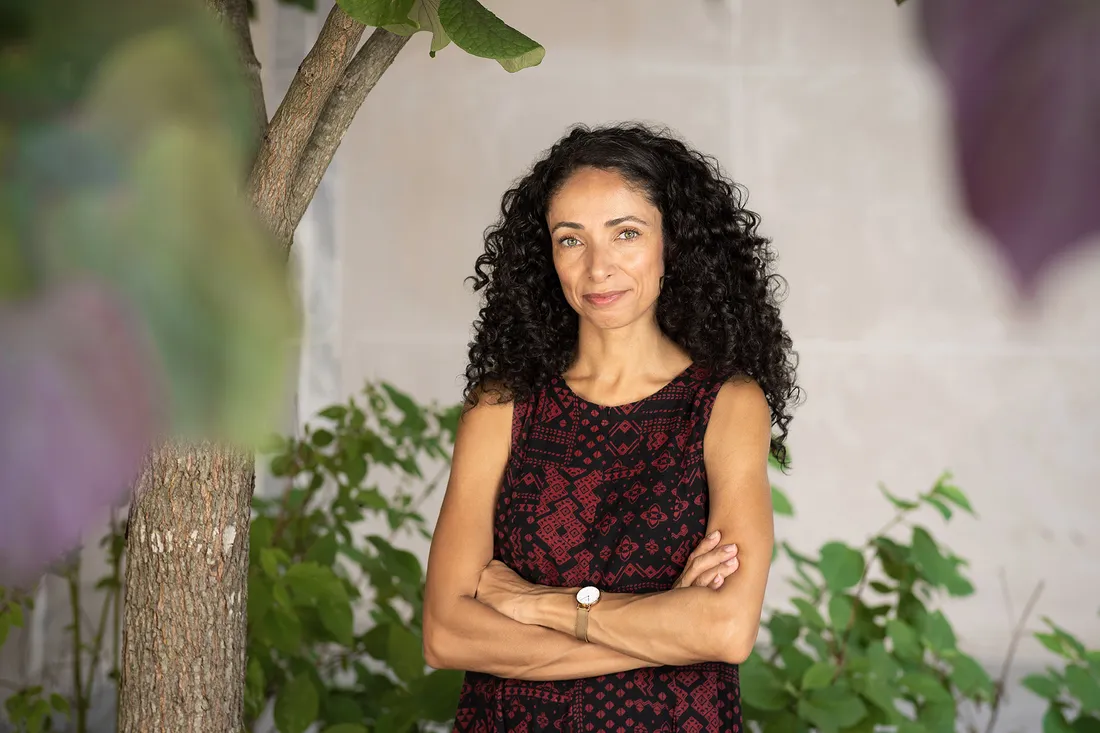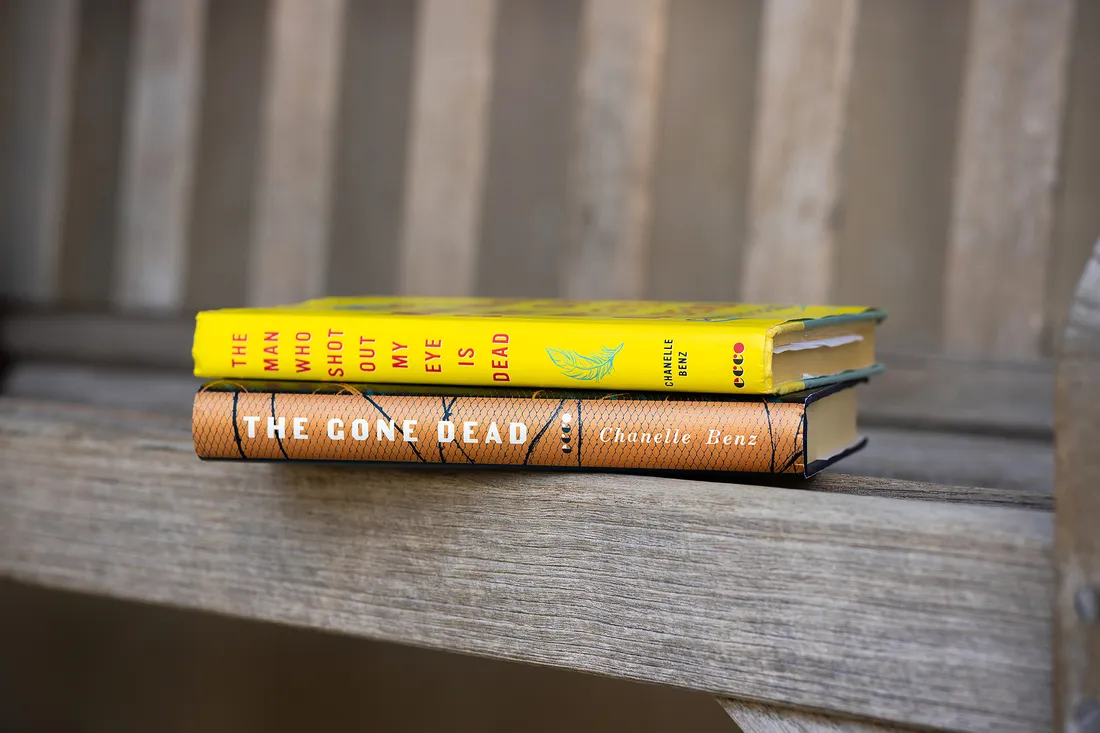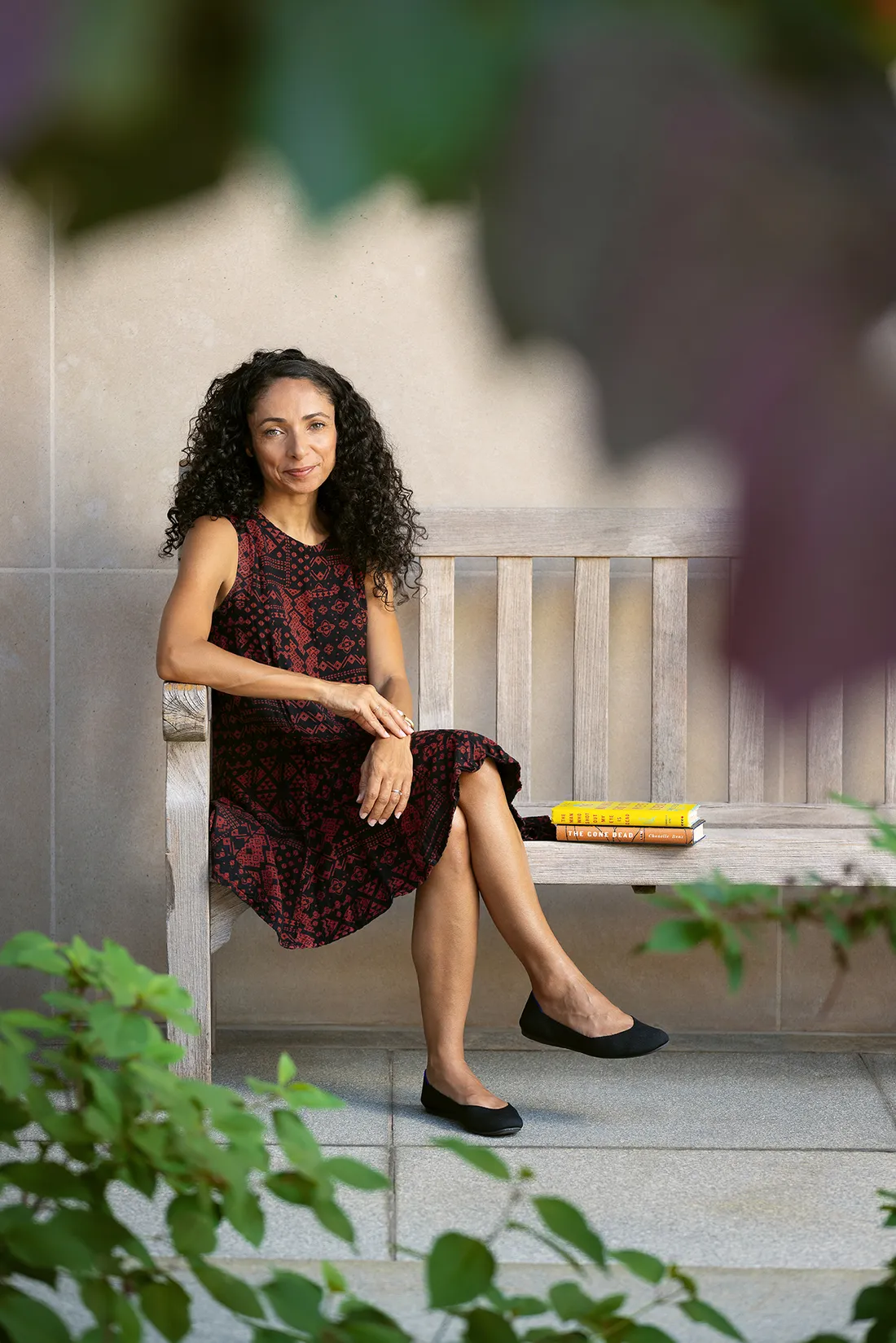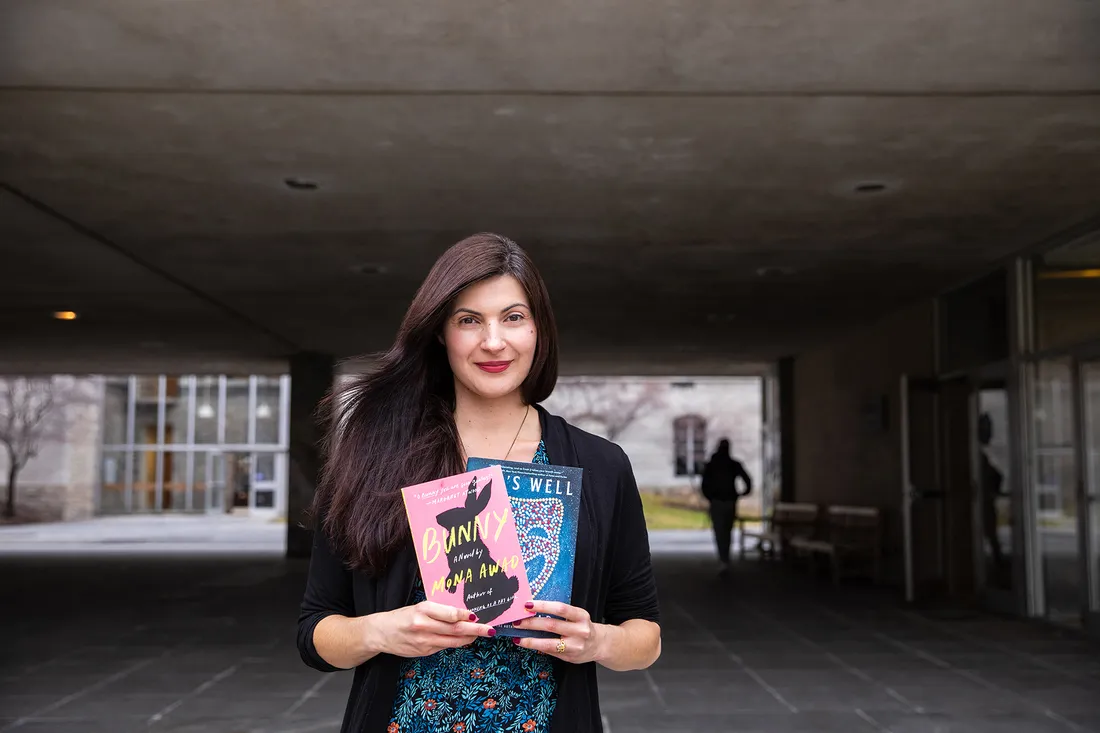
Professor Chanelle Benz G’12 is among a handful of students-turned-colleagues in the esteemed creative writing graduate program.
The great English author Somerset Maugham was once asked if he wrote on schedule or when inspired. “I write only when inspiration strikes,” he replied. “Fortunately, it strikes every morning at nine o’clock sharp.”
Wise words that Syracuse University professor Chanelle Benz G’12 lives by. The London-born novelist—whose 2019 debut, The Gone Dead, was longlisted for a PEN/Hemingway Award and Center for Fiction first prize—insists that inspiration is nothing more than an emotion or a feeling. Something plucked from the ethers. “If you’re an actor and you have a migraine and you’re supposed to perform—well, that night, you’re playing a character with a migraine,” says Benz, who also has a background in theater. “You have to be patient with yourself.”

A classically trained actor, Benz views language as something physical. “It affects me as much as I do it,” she says.
This is true of other areas of her life. A member of the College of Arts and Sciences’ esteemed creative writing graduate program, Benz also is the mother of two young children. Finding time to jot down a few sentences after everyone goes to bed is a never-ending quest. A balancing act to which almost any young parent—never mind a rising literary star—can relate.
Which makes the runaway success of The Gone Dead more remarkable. An unflinching look at race, justice and memory, the plot concerns a woman’s return to the Mississippi Delta, where her father, a Black poet and activist, died years before under mysterious circumstances.
The project was inspired by a two-year stay in Hattiesburg, Mississippi, where Benz’s husband was working on his Ph.D. “The history of the Deep South is a living history, and its past is palpable,” she says.
Both the cradle of the Civil War and birthplace of the blues, the Mississippi Delta figures prominently in the rise and fall of slavery. The area also served as a backdrop for the 1964 Freedom Summer Project, which sought to integrate the state’s political system by registering Black voters.
Benz’s interest in the Delta’s “lush, wounded landscapes,” particularly after the Freedom Summer movement, convinced her to put pen to paper. “Drawing on my own experiences and preoccupations with the Delta, I felt like I could find my way into a different story.”
The history of the Deep South is a living history, and its past is palpable.
Professor Chanelle Benz
Championing Divergent Voices
While new to the creative writing faculty, Benz is no stranger to the program itself, having graduated from it more than a decade ago. She joins a growing list of students-turned-colleagues, including professors George Saunders G’88, Chris Kennedy G’88, Brooks Haxton G’81 and Sarah Harwell G’05.
“The ethos of the creative writing program is still the same, but it’s now more diverse and inclusive,” observes Benz, who joined the faculty last year. “Being receptive to different ideas and perspectives makes us more inventive and inspired.”
A workshop atmosphere, where peer review and mentoring thrive, is important, too. Professor Dana Spiotta’s own career was flowering while serving as Benz’s thesis advisor. “She suddenly seemed fully formed as a writer,” says Spiotta, recalling Benz’s third and final year as an M.F.A. student. “Innovative, ambitious, startling on the sentence level—many of Chanelle’s stories were included in her brilliant debut collection, The Man Who Shot Out My Eye Is Dead. She just keeps getting better.”
The ethos of the creative writing program is still the same, but it’s now more diverse and inclusive. Being receptive to different ideas and perspectives makes us more inventive and inspired.
Professor Chanelle Benz

Benz followed up her literary debut, The Man Who Shot Out My Eye Is Dead (2017), with her first novel, The Gone Dead (2019). “She just keeps getting better,” says fellow professor Dana Spiotta.
Benz’s relationship with language is admittedly unorthodox. Credit her fresh, uninhibited prose to a lifetime on the stage. “My approach to writing isn’t what you’d call academic. It’s muscular,” says Benz, who earned a B.F.A. in acting from Boston University. “I see language as physical, and, in the process of writing, it affects me as much as I do it.”
One of her biggest fans is Mary Karr, a Trustee Professor and the Jesse Truesdell Peck Professor of Literature at Syracuse. She says that while Benz’s output is funny and smart, it doesn’t smack of a particular school or style. “Chanelle understands our nontraditional tradition,” adds the renowned poet and memoirist. “We’re known for hiring folks who accept and champion divergent voices.”
Snapping into Place
The daughter of English and Antiguan parents, Benz moved to the United States as a child and spent the next decade “roaming around.” Traveling exposed her to universal themes—so-called “ripples across the generations”—that seeped into her writing.
Among the recurring motifs of The Man Who Shot Out My Eye Is Dead are love, violence and abandonment. Told through different historical settings, the 2017 opus sheds light on the underdog. “I’m not so much concerned about characters winning or losing as I am with giving them voice,” admits Benz, whose collection was named one of the year’s best books by the San Francisco Chronicle and Electric Literature magazine. “I’m interested in the unknown or the omitted as well as forgotten stories that push back against master narratives.”
I’m not so much concerned about characters winning or losing as I am with giving them voice.
Professor Chanelle Benz
This trait spills over into her teaching, where she encourages students to find out what “gets in the way of the magic,” explains Kevin Jiang G’23, a second-year M.F.A. student. “Professor Benz reminds us that flawed drafts are essential bits of a larger process—of revising a story, of being an artist, of becoming ourselves. We need to question what we think we know and laugh a little along the way,” he says.
Fellow second-year student Courtney Noh G’23 recalls the time that Benz shared an early draft of a published work with her. Glimpsing Benz’s creative process, the behind-the-scenes experimentation and risk taking, gave Noh a renewed appreciation for her professor, who often cranks out 25-50 pages of a draft before setting them aside to marinate. “Professor Benz exposes the good, bad and everything in between—the messiness and vulnerabilities that come with being human.”
Benz likens writing to solving a jigsaw puzzle: “You’re constantly moving pieces around until everything snaps into place. When it does, it’s magic.”
Professor Benz reminds us that flawed drafts are essential bits of a larger process—of revising a story, of being an artist, of becoming ourselves. We need to question what we think we know and laugh a little along the way.
Kevin Jiang G’23
Truth in Fiction
Trial and error are at the heart of The Gone Dead, which came out as racial discord was sweeping the nation. The health inequities laid bare by the COVID-19 pandemic, compounded by the murder of George Floyd, sparked nationwide protests. Benz’s novel proved timely and relevant, landing on multiple best-of lists, including those of The New York Times and The Tonight Show Starring Jimmy Fallen.
She spent five years on the book, touring museums and historical sites as well as soaking up autobiographies, documentaries and spoken-word recordings. “I love creating dialogue,” says Benz, who was drawn to the characteristic lilt of many of her interviewees.
The result is a heaping slice of Southern Gothic, slathered in mystery, intrigue and existentialism. Among the characters are a landowner, a scholar, a love interest and a former klansman, all of whom tease out and support the protagonist’s story. Such counternarratives accord a more complete picture of the past, Benz says.

“Being receptive to different ideas and perspectives makes us more inventive and inspired,” says Benz, also a sought-after teacher.
Spiotta considers The Gone Dead a “sharp, soulful” work. “It reads like a thriller but an intimate one—a genuine page-turner that is also a complex character study. A subtle novel about race, class and historical legacy,” she says.
Inspired by dozens of cold cases from Jim Crow-era Mississippi, Benz elaborates on how the backlash from the 1955 murder trial of Black teenager Emmett Till, in which two white suspects were acquitted by an all-white jury, virtually kickstarted the civil rights movement. “What’s less known is how many other people were involved in his brutal kidnapping and murder,” she says. “It wasn’t just two evil men, but a community that enabled it to happen.”
And that’s the point of Benz’s storytelling—nothing happens in isolation. “There are always different perspectives of historical moments,” she continues. “Our experience is shaped by these witnesses, these ancestors, whether we know it or not.”
Such multi-perspectivity is the mark of a “spectacularly original” writer, opines Jonathan Dee, associate professor and director of Syracuse’s 60-year-old M.F.A. program. “Chanelle Benz is a gift to us in terms of continuity and institutional memory. She knows firsthand what a difference this program can make in a young writer’s life.”


